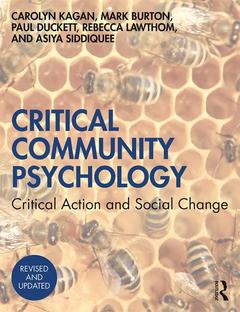Critical Community Psychology (2nd Ed.) Critical Action and Social Change
Auteurs : Kagan Carolyn, Burton Mark, Duckett Paul, Lawthom Rebecca, Siddiquee Asiya

This accessible textbook draws upon progressions in academic, political and global arenas, to provide a comprehensive overview of practical issues in psychological work across a diverse range of community settings.
Interest in community psychology, and its potential as a distinctive approach, is growing and evolving in parallel with societal and policy changes. Thoroughly revised and updated, this new edition covers crucial issues including decolonial approaches, migration, social justice, and the environmental crisis. It has a new chapter on archive research, working with data, policy analysis and development, to reflect the continuously developing global nature of community psychology. Key features include:
- Sections and chapters organised around thinking, acting and reflecting
- Case examples and reflections of community psychology in action
- Discussion points and ideas for exercises that can be undertaken by the reader, in order to extend critical understanding
Aiming to provide readers with not only the theories, values and principles of community psychology, but also with the practical guidance that will underpin their community psychological work, this is the ideal resource for any student of community, social, and clinical psychology, social work, community practice, and people working in community-based professions and applied settings.
- Introduction
- What is critical community psychology?
- Core elements of a critical community psychology
- The contested nature of community
- Community as social ties
- Problem definition
- Action planning
- Action 1: furtherance of critical consciousness and creation of new forms of social settings
- Action 2: Development of alliances, and accompaniment, advocacy and analysis of policy
- Action 3: Archive research, policy analysis and development
- Evaluation
- Change, influence and power
- Roles, skills and reflections on learning for community psychologists
- Critical disruption: Does critical community psychology have an adequate praxis?
PART I: THINK!
PART II: ACT!
PART III: REFLECT!
Carolyn Kagan is a Professor Emerita Community Social Psychology at Manchester Metropolitan University. Having retired from the university she now works as a scholar activist on local participation and community development projects and on climate/economic/social justice policies at the regional level, through the collective, Steady State Manchester. @CarolynKagan
Mark Burton is a scholar-activist, working on a variety of environmental, economic and political issues. Among other activity he is part of the Steady State Manchester collective which explores and promotes a post-growth approach to economy and society in the city-regional context. For many years he worked as a psychologist and manager in health and social care services. @MarkHBurton
Paul Duckett is an academic community psychologist at Central Queensland University, Australia. He works in the fields of disability and mental health and has worked alongsidedisabled people including people with mental health difficulties and people with learning difficulties since 1988. He has a YouTube channel where he posts videos on topics and issues relevant to Critical Community Psychology – just search for Paul Duckett.
Rebecca Lawthom is Professor of Community Psychology in the Faculty of Health, Psychology and Social Care at Manchester Metropolitan University. She co-directs the Research and Knowledge Exchange Centre entitled Health, Psychology and Communities. Her research embraces creative, participatory methods. @rebeccalawthom
Asiya Siddiquee is Senior Lecturer in the Department of Psychology at Manchester Metropolitan University. Her research has centred around wellbeing in various contexts - digital technologies, refugee women and arts for health. Working with mixed methods research, her future aspirations are to explore issues regarding equality, social justice and cultural diversity.
Date de parution : 10-2019
18.9x24.6 cm
Date de parution : 10-2019
18.9x24.6 cm
Thème de Critical Community Psychology :
Mots-clés :
Critical Community Psychological; community psychology; UK Coloni; social psychology; Community Psychology Courses; clinical psychology; Online Communities Function; social work; Community Interest Company; social care; Epistemic Injustice; community practice; Gated Communities; community work; public health; Billboard Liberation Front; human geography; Social Structural Dimension; urban regeneration; Fourth Generation Evaluation; sustainable development; Manchester Metropolitan University; policy; Core Capitalist Countries; public administration; Younger Men; CBL; UK Focus; Force Field Analysis; Reflective Practice; Normative Social Influence; Participatory Policy Making; Data Sets; Financial Outsiders; Ashutosh Gowariker; Colonial Administration; UK Muslim



